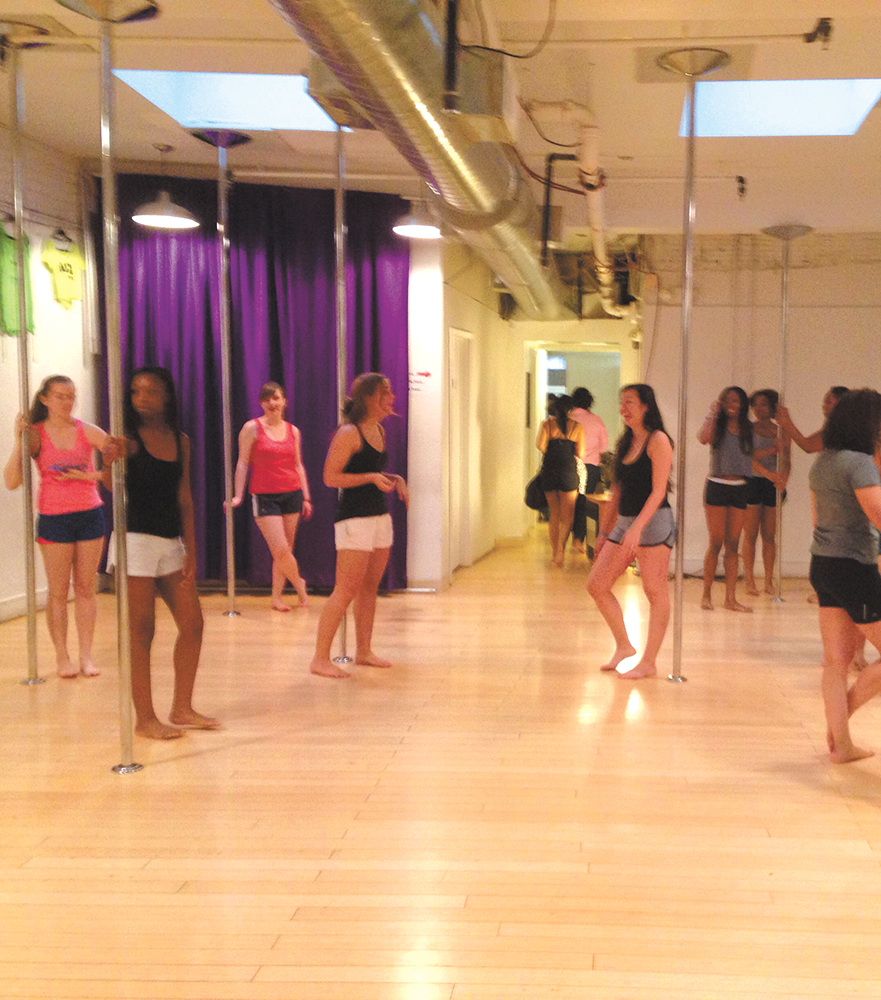
A pole-dancing class was one of the featured events during Sex-Positive Week.
United Feminists are in the midst of an annual Sex-Positive Week at Georgetown University, which runs from Feb. 26 to March 5.
The week is dedicated to conversations and events about sex-positive feminism, where students are free to express their sexual selves and learn about others’ expressions of sexuality.
Established in 2009, Sex-Positive Week has been an annual event for the United Feminists, and initially drew ire from groups such as the Knights of Columbus. Despite past controversy, United Feminists has retained its Student Activities Commission funding.
“We are trying to make it seem like that’s the norm. We feel like our presence is needed and we will work harder with the administrators to keep our spot here on campus. … We’re not going anywhere,” United Feminists Co-chair Sofia Ladner (NHS ’16) said.
This year’s coordinators worked to make their presence felt through several events and advertising.
“With Sex-Positive Week we definitely are just trying to make an open dialogue about consent. We know that that’s really difficult here on campus with a Catholic identity,” United Feminists Co-chair Kimberly Blair (COL ’15) said. “We are not promoting sex; we are promoting expression, consent and dialogue.”
The theme of sex positivity also allows the week to address other issues that might be avoided on campus.
“What sex positivity talks about is some of the things we shy away from [like] talking about sex workers and workers’ rights, talking about transgender and sexuality … just a matter of talking about it and getting more knowledge,” Ladner said.
The week began with a social media campaign that included hashtags like #HoyaSexa, #SexPositiveWeek and #SexPositive. The hashtag campaign occurred on both Facebook and Twitter but did not receive the response United Feminists expected.
“It was not the full-fledged response that we wanted. Right now, it’s a big campaign week, so we were competing with a lot of other hashtags,” Blair said. “A lot of people are still afraid to address sex positivity.”
United Feminists also led a trip Saturday to Jordin’s Paradise, a studio that offers a pole fitness class. Around 20 students participated in the class, which was followed by a discussion on exhibitionism and a performance from the instructor at the end.
The week also features a movie showing of “Our Bodies, Our Minds” on Tuesday night followed by a discussion with Kathleen Guidroz, a professor in the sociology department. The movie focuses on feminists who work in the adult entertainment industry, ranging from prostitutes to exotic dancers. The narratives from the women in the movie serve to demonstrate the unusual perspective of these women and their emphasis on freedom of expression.
“One thing we need to keep in mind is that people’s experiences in the sex industry are never entirely negative nor are they entirely positive,” Guidroz said. “[The industry] is not something that should be seen as shameful or inherently wrong.”
The United Feminists and Guidroz hope that the discussion will give students a more educated look at the sex industry and just encourage conversation around the topic.
“I hope people come out and watch the film and listen to what the individuals in the film have to say about their experiences. … [Sex positivity] is more than college students talking about college students’ sexuality, but [is] also a larger social issue with people like sex workers,” Guidroz said.
The final event of Sex-Positive Week is GSPOT-light, an open-mike night at Uncommon Grounds on Wednesday evening. The night is dedicated to conversation about self-expression and sexuality.
“We just want it to be known that if you come to this spot, you can just have self-expression. You can perform a Beyoncé song, your own poem or just say the word ‘sex.’ We just want to make people feel liberated and positive about the issue,” Ladner said.
Some students felt that although the week brings important topics to light, discussion should not be restricted to a particular timeframe.
“I think it’s a great idea, I think that generally feminism is not something that leaves an English classroom discussion, and it’s good that it’s being talked about … in terms of social light,” Eliza McCurdy (COL ’17) said. “But obviously, the classic complaint about that is it’s something that shouldn’t be restricted to a certain week or to a certain amount of time, it should be something that eventually becomes regular and normal.”
Multiple members of the Knights of Columbus declined to comment for this article.














